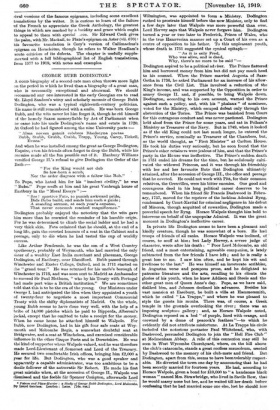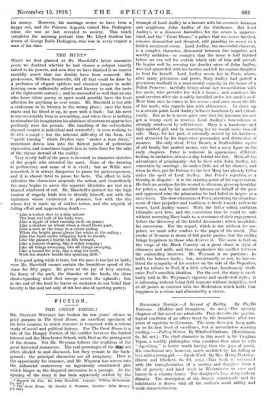GEORGE BUBB DODINGTON.*
A GOOD biography of a second-rate man often throws more light on the period in which he lived than a biography of a great man,
who is necessarily exceptional and abuormaL We should recommend any one interested in the early Georgian era to read Mr. Lloyd Sanders's witty and scholarly memoir of George Bubb
Dodington, who was a typical eighteenth-century politician. his name is still remembered with a smile. He was born George
Bubb, and the wits never let him forget it, though he rid himself of the homely Saxon monosyllable by Act of Parliament when he came into his uncle Dodington's name and estate in 1720. At Oxford he had figured among the nine University poets :— " Alma novem genuit celebres Rhedecvna poetas 13ubb, Stubb, Grubb, Crabb, Trapp, Young, Carey, Tickell, Evans."
And when he was installed among the great as George Dodington, Esquire, even his friends often forgot to drop the Bubb, while his enemies made all the fun possible out of it. Haubury Williams versified George IL's refusal to give Dodington the Order of the Bath :— "For the King would not dub So low-born a scrub, • Nor the order disgrace with a fellow like Bob."
To Pope, who hated him for his "insolent civility," he was "Bubo." Pope scoffs at him and his great Vanbrugh house of Ea.etbory in the "Moral Essays" :—
" See ! sportive Fate, to punish awkward pride, Bids Bubo build, and sends him such a guide ; A standing sermon, at each year's expense, That never coxcomb reached magnificence."
Dodington probably enjoyed the notoriety that the wits gave him more than he resented the reminder of his humble origin. For he was determined to climb the social ladder and he had a very thick skin. Fate ordained that he should, at the end of a long life, gain the coveted honours of a seat in the Cabinet and a peerage, only to die when he had tasted the cup of worldly success.
Like Arthur Pendennis, he was the son of a West Country apothecary, probably of Weymouth, who had married the only ister of a wealthy East India merchant and placeman, George Dodington, of Eastbury, near Blandford. Bubb passed through Winchester and Exeter College, Oxford, and in 1711 started on the "grand tour." He was returned for his uncle's borough of Winchester in 1715, and was soon sent to Madrid as Ambassador to succeed Sir Paul Methuen, "who by his Treaty with Portugal had made port wine a British institution." We are sometimes told that this is to bathe era of the young. Our Ministers under George I. had anticipated the idea when they appointed a youth of twenty-four to negotiate a most important Commercial Treaty with the shifty diplomatists of Madrid. On the whole, young Bubb seems to have done very well, with the help of a bribe of 14,000 pist,oles which he paid to Ripperda, Alberoni's jackal, except that he omitted to take a receipt for the money. When he came home he attached himself to Walpole. For Bubb, now Dodington, had in his gift four safe seats at Wey- mouth and Melcombe Regis, a somewhat doubtful seat at Bridgwater, and a seat at Winchelsea, and exercised considerable influence in the other Cinque Ports and in Dorsetshire. He was the kind of supporter whom Walpole valued, and he was therefore made Lord-Lieutenant of .Somerset and Lord of the Treasury. He secured two comfortable Irish offices, bringing him £2,000 a year for life. But Dodington, who was a good speaker and apparently a capable administrator, was too ambitious to be a docile follower of the autocratic Sir Robert. He made his first great mistake when, at the accession of George IL, Walpole was dismissed and the feeble Sir Spencer Compton, afterwards Lord
• Patron and Place-Hunter : a Study of George Bubb Dodington, Lord Macomb., By Lune Undue. London : Line. Ns. net.]
Wilmington, was appointed to form a, Ministry. Dodington rushed to prostrate himself before the new Minister, only to find a few days later that Walpole was more powerful than ever. Lord Hervey says that Walpole never forgave him. Dodington turned a year or two later to Frederick, Prince of Wales, who in the true Hanoverian manner set up a Court of his own as a centre of opposition to his father. To this unpleasant youth, whose death in 1751 suggested the cynical epitaph—
"As it is only Fred, Who was alive, and is dead, Why, there's no more to be said "- Dodington aspired to be a political adviser. The Prince flattered him and borrowed money from him but did not pay much heed to his counsel. When the Prince married Augusta of Saxe- Gotha in 1736, he asked Parliament for an increase of his allow- ance from the Civil List. This involved a reduction of the King's income, and was supported by the Opposition in order to annoy George II. and, if possible, to bring Walpole down. Dodington, according to his own account, warned the Prince against such a policy, and, with his " phalanx " of nominees, voted for the Ministry, which escaped defeat only through the abstention of the Tories. The Prince was banished from Court for this outrageous conduct and was never pardoned. Dodington held aloof from the Prince for some years, and sat in Pelham's Ministry as Treasurer of the Navy. But in 1749, when it looked as if the old King could not last much longer, he entered the Prince's service, nominally as Treasurer of the Chambers, but, as the world thought, as "First Minister" at Carlton House. He took his duties very seriously, but he soon found that the Prince's other retainers were jealous of him, and that the Prince's party in the Ho use was ineffective. The Prince's sudden death in 1751 ended his dreams for the time, but he sedulously culti- vated the widowed Princess, and it was through his friendship with her and her favourite Bute that Dodington ultimately attained, after the accession of George HI., the office and peerage that he coveted. He could not work with Pitt, for their common relatives, the Grenvilles, were his bitter enemies. One good and courageous deed in his long political career deserves to be remembered. When his friend Sir Francis Dashwood in Febru- ary, 1757, moved for the reprieve of the luckless Admiral Byng, condemned by Court-Martial for criminal negligence in his defeat off Minorca, though acquitted of cowardice, Dodington made a powerful speech for Byng. Horace Walpole thought him bold to intervene on behalf of the unpopular Admiral. It was the great moment in Dodington's ineffective career.
In private life Dodington seems to have been a pleasant and kindly creature, though he was somewhat of a bore. He had troops of friends of all ranks. Horace Walpole was inclined, of course, to scoff at him ; but Lady Hervey, a severe judge of character, wrote after his death : "Poor Lord Melcombe, an old friend, and a most entertaining, agreeable companion, is lately subtracted from the few friends I have left ; and he is really a great loss to me. I saw him often, and he kept his wit and liveliness to the last." He was himself an inveterate scribbler, in Augustan verse and pompous prose, and he delighted to patronize literature and the arts, recalling to his clients the glories of his youth, when he knew Addison and Steele and the other great men of Queen Anne's day. Pope, as we have said, disliked him, and Johnson declined his advances. Besides his vast mansion at Eastbury, he built a villa at Hammersmith, which he called "La Trappe," and where he was pleased to style the guests his monks. There was, of course, a Greek temple in the grounds overlooking the river ; there was an imposing sculpttu e gallery ; and, as Horace Walpole noted, Dodington reposed on a bed "of purple, lined with orange, and crowned by a dome of peacock's feathers "—to which he evidently did not attribute misfortune. At La Trappe his circle included the notorious poetaster Paul Whitehead, who, with Daahwood, persuaded Dodington to join the "Hell Fire Club" at Mecimenham Abbey. A relic of this connexion may still be seen in West Wycombe Churchyard, where, on the hill above the club's catacombs, stands a great roofless mausoleum, erected by Daahwood to the memory of his club-mate and friend. But Dodington, apart from this, seem to have been tolerably respect- able. He diverted the town one day by announcing that he had been secretly married for fourteen years. He had, according to Horace Walpole, given a bond for £10,000 to "a handsome black woman" named Mrs. Strawbridge, who lived in Savile Row, that he would marry none but her, and he waited till her death before confessing that he had married some one else, lest he should lose
his money. However, his marriage seems to have been a happy one, and the Princess Augusta visited Mrs. Dodington when she was at last revealed to society. This touch completes the amusing portrait that Mr. Lloyd Sanders has drawn of George Bubb Dodington, who was in every respect a man of his time.







































 Previous page
Previous page